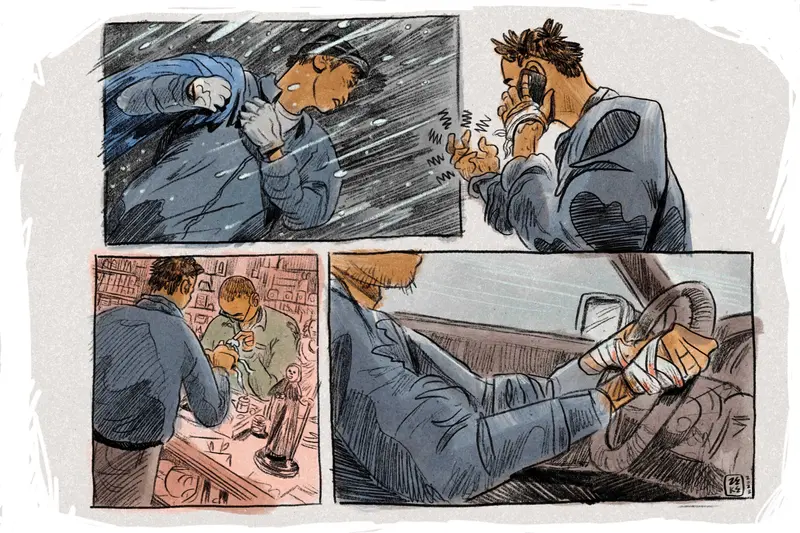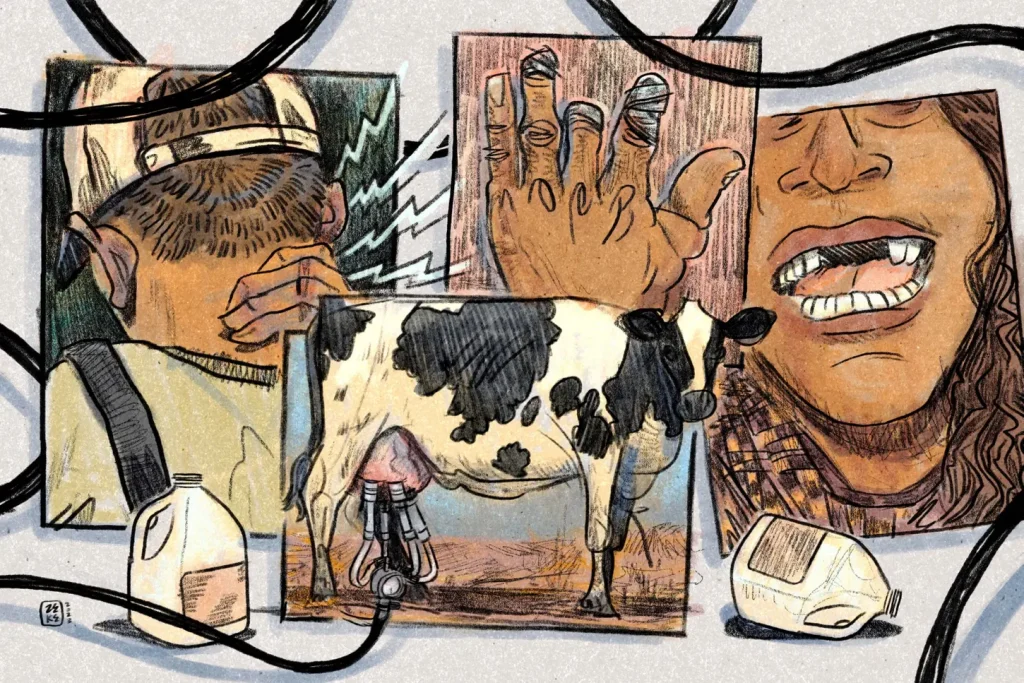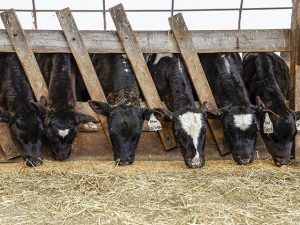
Immigrant workers are essential to Wisconsin’s dairy industry. But when they get injured, they’re often cast aside.
One dairy farm worker said he was fired and thrown out of the house where he lived after he told his boss his hands were frostbitten from working outside in below-zero weather. Another said it took his supervisors nearly an hour to call an ambulance after he was crushed by a metal gate and left lying on a manure-covered barn floor. A third worker said her boss blamed her and refused to pay her medical bills after she was trampled and thrown over a fence by a bull. And yet another said his supervisor told him not to go to the emergency room after he tore open his finger when he fell trying to catch a runaway calf. He was told to call the veterinarian instead.
These are some of the stories immigrant workers will tell you about getting hurt on Wisconsin dairy farms — and what happened afterward.
Others will say everything is fine — “Just the usual” — until you ask the question five or six ways: Have you been kicked? Has a cow stepped on you? Have you fallen? Did you see blood? Do you have chronic pain in your back, arms or hands? Then, almost inevitably, the answer is yes.
Wisconsin’s celebrated dairy industry would almost certainly collapse without the immigrants who do the dirty, dangerous work that farmers across the state say U.S. citizens won’t. But when these workers get hurt — and they get hurt with such frequency that it’s considered a routine part of the job — the laws are stacked against them.
Many, if not most, of the state’s 5,700 or so dairy farms aren’t required to have workers’ compensation insurance because they have too few employees, while at larger farms the supervisors often brush off workers’ injuries. Employers can fire and evict injured workers almost without consequence. And the threat of being deported factors into any decision workers make to assert the limited rights they do have.
As a result, many workers get no medical care for their injuries, compensation or even time off to recuperate. Instead, they are at the farmer’s mercy and have to brace themselves for the possibility of losing their jobs and the roof over their heads.
“Once you’re no good to them, they get rid of you,” said a worker who was fired and, along with his wife and two children, evicted in November after he developed tendonitis in his hand from repetitive motions at work. “I wouldn’t want anybody else to go through this.”
What we know about the frequency of injuries on dairy farms is widely understood to be an undercount. The U.S. Bureau of Labor Statistics relies on farms to self-report injuries, but it only surveys the largest farms. Wisconsin’s workers’ compensation system offers some insight, showing that just over 170 claims were filed in 2021, the most recent year available, according to the state officials. But that figure excludes injuries that occurred on small farms that don’t have workers’ compensation coverage, and those that were never reported. Often, workers say they are so afraid of losing their jobs that they tell hospital staff their injuries happened at home.
Over the course of the past year, ProPublica has interviewed more than 60 current and former workers who said they suffered injuries on Wisconsin dairy farms. All but a handful of them were undocumented immigrants; the others have work permits. Nearly every one asked not to be fully identified because they fear losing their job or being deported. Most asked that the farms where they got hurt not be named either; they or their relatives continue to work and live on those farms, and they are afraid of retaliation.
Few injuries leave a paper trail. Workers don’t always take photos of their broken legs or smashed teeth or torn-off fingers. Sometimes they don’t even know the name of the farm where they were kicked by a 1,500-pound cow. No medical records exist for injuries that go untreated. Farm owners, meanwhile, don’t consistently report injuries to authorities. Law enforcement records offer a glimpse of the worst farm accidents, but only when somebody calls for an ambulance. That rarely happens.
“It’s almost like people are disposable. And it’s horrific,” said Martha Burke, an employment discrimination and workers’ compensation attorney in Milwaukee. “Employers aren’t supposed to fire you for being injured, but that doesn’t mean it doesn’t happen.”
Excluded from many basic protections that other workers are entitled to, Wisconsin’s immigrant dairy workers are left to fend for themselves. They ask the owners of the nearest Latino-owned grocery store for advice about finding a doctor or a lawyer or even a place to sleep. They buy painkillers one capsule at a time and rub a tingly blue lotion for cow udders on their bruised arms. Most said they work through the pain because they need the paycheck.
Some workers quietly leave their jobs — and Wisconsin altogether — to nurse their wounds with relatives. Some go home to Mexico or Central America.
“It was months of pain,” said a man who dislocated his shoulder when he slipped on a cow’s placenta. “The pain only went away after I left the farm.”
Farmer Andy Lodahl and his wife told their workers to get ready because a storm was coming and they would need to work “a lot of hours” in the cold, wind and snow. “Make sure you all have a lot of warm clothes,” they said they typed into a phone, then translated into Spanish and showed the workers.
It was late December 2022, and Lodahl said he and his wife let the workers end a shift early and gave them an advance on their pay so they could buy winter gear.
Seferino José García, 62, was familiar with Wisconsin’s brutal winters. An immigrant from the Mexican state of Oaxaca, García had worked on dairy farms on and off for about a decade before he was hired about two weeks earlier on this small farm about 45 minutes northwest of Milwaukee. He was one of three workers and, in an arrangement that’s typical on dairy farms, lived in a house on the property.
One morning, García and his co-workers wore thin cotton gloves over latex gloves to do a number of tasks outside, including shoveling snow and feeding calves. García said it was hard to wear gloves at all and maintain his grip. It was below zero with wind gusts of more than 30 miles an hour. García said he felt like the wind was going to carry him away.
Blisters began forming on his hands. At one point, he submerged them in hot water, but that made the blistering worse. Still, he kept working. He finished his first eight-hour shift around 11 a.m. and went back to the house. He said he called the farmers and told them he couldn’t return for his 3 p.m. shift.
“I couldn’t feel my fingers anymore,” García said in an interview. “I couldn’t feel my own body when I touched it.”
The farmers told García he couldn’t take the afternoon off; the cows needed to be milked. But García told his bosses he wasn’t able to work. One of his co-workers couldn’t either; his fingers were frostbitten, too.
Lodahl and his wife told them both to vacate the property immediately. (The third worker also had frostbite but continued working, according to Lodahl.) García grabbed what he could from the house and left.
Most workers we spoke to know somebody who lost their job after an injury or have experienced this themselves. Several also were evicted, including the man who couldn’t use his right hand after he developed tendonitis from the repetitive motions of driving a skid steer. Adding insult to injury: He said his final paychecks bounced, so he’s still owed two weeks of wages.
“I’ve never been treated so badly in all my years working on farms,” said the man, who in mid December was still sleeping in a nephew’s living room along with his wife and two daughters. “Maybe there are laws that protect you, but for people like us, we don’t know where we can turn.”
Most Wisconsin dairy workers are considered at-will employees, which means they can be fired without cause, though employers can’t fire them in retaliation for asserting certain rights such as filing a workers’ compensation claim. Meanwhile, several attorneys said workers’ rights in the face of eviction are gray. Those who can show that there’s a landlord-tenant relationship — if housing costs are deducted from their wages, for example — may get more time to move out. But few workers challenge firings or evictions.
“These folks don’t want problems,” said Gabriel Manzano Nieves, a lawyer who provided García with legal counseling but didn’t file a case. “They don’t want the police called on them. He’s obviously not going to push back too much under those circumstances.”
After he was fired and evicted, García drove to Lupita’s Market & Restaurant in the nearby city of Beaver Dam, where he usually bought his groceries. Meinardo Enriquez, the store owner, said he chided García for not wearing proper gloves. He squeezed the fluid out of some of his blisters to relieve the pain and encouraged García to get medical care.
That night, García slept in the laundromat next door. Before dawn, he headed to South Carolina, where he has a niece. He put a shirt on his lap to catch the blood that dripped from his hands. As he drove, he said he tried to push bad thoughts out of his head and focus on the positive. “I was thinking about my mother. My sisters. My children. My wife,” he said. “Oh, dear Lord, why did this happen to me?”

After he arrived in South Carolina, his niece took him to the hospital despite his protests. He was worried about the cost. García returned a few more times to be examined but stopped going in February when he ran out of money.
By April, he said the feeling had started to return to his fingers. He’d lost six of his nails and had been told the rest would fall off, too. He was giving himself physical therapy he’d been taught at the hospital. He wanted to find a job but didn’t know what he could do since his hands didn’t work like they used to.
Lodahl, meanwhile, said that losing two workers unexpectedly put him and his wife under immense pressure right before Christmas. It took several days to replace them — days in which the farm owners had to work around the clock with their one remaining worker to keep everything running.
“The cows do not stop making milk because people made the choice to be insubordinate and not have the ability for self-preservation and not show up to work,” he wrote in an email.
Lodahl said he and his wife were justified in firing and evicting García and the other worker for refusing to do their jobs. The workers, they said, were to blame for not wearing better winter gear and getting frostbite.
(Workers who get frostbite and other injuries related to extreme temperatures can pursue workers’ compensation claims, state officials and attorneys said. But Lodahl’s farm didn’t employ enough workers to be required to have coverage.)
Before winter arrived this year, the Lodahls bought heavy gloves for their employees.
On another dairy farm near Milwaukee, a Nicaraguan woman worked for months without seeking medical care for an injury because she didn’t know how she would pay for it.
Carmen, who is 40, said she felt so much pain in her head, back and arms that she could barely think clearly. She said she didn’t know how she got injured but suspected it was related to the repetitive motions of attaching and detaching milking tubes to cow udders hundreds of times a day.
“I couldn’t even walk straight,” she said. But she felt she had “to keep my head down and swallow” the pain because she needed the money.
Carmen, a single mother, makes $12 an hour and works 10 hours a night, six nights a week. In addition to supporting her young daughter and her ailing mother back home, as of November she still owed $13,000 to the person who loaned her money to immigrate to the U.S. last year.
She said she hasn’t told her employer about the injury because she is afraid he will get upset and fire her. Carmen and her daughter live in a house the farm owners provide their workers.
Across the state, dairy workers face a variety of barriers to getting medical care: limited transportation, the challenges of finding someone to fill their shifts and the high cost of medical care without health insurance.
Many workers said their supervisors dismissed their injuries and told them to get back to work, even when they were unable to walk. Among them: a 52-year-old woman who said she was knocked unconscious by a cow two years ago on a large farm in western Wisconsin. When supervisors refused to take her to the hospital, a co-worker drove her, according to the woman and the co-worker.
Later, a doctor said she could return to work, as long as she took frequent breaks. But the farm owner told her he couldn’t accommodate her needs and fired her, she said. Today, the woman can’t work at all, sleeps in a friend’s trailer and relies on a food pantry. She walks with a cane and can’t afford any additional medical care. She also owes nearly $70,000 for the treatment she has already received.
“They haven’t paid the bills,” she said of her former employers. “They offered me $2,000 to go back to Mexico.”
Other workers said they had been humiliated, insulted or called racial slurs by their supervisors after saying they had been hurt. As a result, they didn’t press the issue and never got medical attention.
“You get scared to say anything because they get mad and start yelling and saying bad words,” said one 54-year-old worker who said a cow kicked him in the chest last year while he was milking it. “I healed on my own. I thought I would die.”
Even when supervisors allow workers to get medical care, they face other barriers. Workers typically make between $11 an hour and $15 an hour. Few get health insurance through their jobs. The state’s public insurance program, BadgerCare Plus, doesn’t cover undocumented adults unless they are pregnant or in labor. If they have a serious medical emergency, undocumented immigrants may qualify for some BadgerCare Plus coverage, but this option is not widely known by workers.
In addition, the state bans undocumented immigrants from getting driver’s licenses, as ProPublica has previously reported, forcing many workers to rely on friends, co-workers and supervisors for rides to the clinic or hospital.
Then workers have to weigh whether they can afford to take unpaid time off to see a doctor. Workers routinely log 70 to 80 hours a week, split among multiple shifts each day, sometimes with no days off. That’s especially true for recent immigrants who want to work more hours to help pay down the debts they owe to people who help them get into the U.S.
And while Wisconsin guarantees workers at least one day of rest each week, the law excludes the dairy industry.
Workers also have to find somebody to cover their shifts, and “the boss has to say that that’s okay,” said Lisa Schiller, an associate professor at the University of Wisconsin-Eau Claire and nurse practitioner who runs a mobile health clinic with county health departments that visits dairy farms. She said she knows of some farmers who help workers get to their appointments or even fill their shifts themselves. But others don’t.
Several workers said they were pressured to return to work before they recovered, including a man who lost part of his finger and worried about getting cow feces in his healing wound. He said he overheard a supervisor tell the doctor not to perform surgery to close the wound because the worker was needed on the farm the next day. The worker said he was so shocked he asked a hospital interpreter if he heard right; she confirmed it, adding that he had the right to be treated without his supervisor present. The worker asked his supervisor to leave and got the surgery.
Others said their jobs got filled by another worker while they recovered.
Federal law allows many workers to take time off for their health needs without losing their jobs. But it applies only to employers with at least 50 workers, and few Wisconsin dairy farms are large enough to qualify. Meanwhile, the Americans with Disabilities Act requires employers to provide reasonable accommodations for workers whose injuries leave them with a disability or a perceived disability. But the federal agency that enforces the law covers only employers with at least 15 workers.
Workers at smaller farms who believe they were fired because of their disability can lodge a discrimination complaint with a state agency. The state does not track discrimination complaints by industry, though several attorneys said dairy workers rarely file them.
One worker said he needed six weeks to recover after a bull slammed into him, breaking his nose, jaw and several teeth. In that time, the farm hired another man to replace him as the lead worker in the milking parlor. When he returned to the farm, he had to work under his replacement.
He said he got frequent headaches and experienced blurred vision and felt pressured to quit. Eventually, he did. It took him more than four months to find another job.
Some farmers do make sure their workers get the treatment and recovery time they need after they’re injured. Several workers said a farm owner drove them to an emergency room or clinic and paid out of their own pocket for medication. Some said their supervisors didn’t hesitate to file a workers’ compensation claim so their medical care was covered.
One man, an immigrant from Nicaragua, described with awe his boss’ reaction after a cow kicked his hand against a metal post. The owner of the small farm in central Wisconsin, where he is the only employee, took him to a clinic, paid for the visit and gave him a week off to heal at full pay. When the worker tells friends on other farms what happened, he said “they can’t believe it. It’s something that rarely happens.”
For Alicia Fetzer, who is the business office manager for her family’s large farm in western Wisconsin, it’s a matter of basic humanity. She said the farm typically covers the costs related to minor injuries, leaving workers’ compensation claims for serious accidents.
But she knows not all farms can easily afford to do that. “I’m not dumb to the fact that we are very successful; therefore we have the funds to say, ‘Hey, I’ve got to take this guy to the ER and we might be paying this bill,’” she said. “That doesn’t put me in a pinch.”
At many farms, the expectation is that workers will pay for their own care after work injuries. One man whose two front teeth were snapped in half after a cow kicked him last month said his employer gave him a piece of paper with the name and number of a dental clinic that treats uninsured residents. He called, scheduled an appointment, and is now waiting to be treated.
In the meantime, the man said he tries to keep his mouth closed when he’s outside so the winter air doesn’t hit his open teeth. “It’s uncomfortable,” said the man, who is 32. “When you’re here illegally, sometimes you just say, ‘Oh well.’ What are you supposed to do?”
Several workers said they have received treatment through free or sliding-scale clinics or hospital charity care programs. Rebecca Steffes, the nurse manager of a free clinic in Dodgeville, in southwest Wisconsin, said she routinely sees dairy workers come in with a range of injuries — from kicks or chemical exposure to lower back pain or carpal tunnel symptoms. The clinic helps workers with more serious injuries get charity care from a local hospital.
“I would really like the farmers to effectively take responsibility for their workers,” said Steffes, who grew up on a dairy farm in the state. “They are bringing them here. They are working here. We’ve got to create a system that also takes care of their workers and their families.”
Sometimes injured workers eventually get connected to medical care by the generosity of somebody outside the farm who happened to notice them. That’s what happened to Carmen, the Nicaraguan woman who is afraid to tell her boss she is hurt.
A few months ago, Carmen was walking with a limp and held her head with such obvious discomfort that the owners of the Mexican store where she cashes her checks convinced her she needed medical care. The owner called his mother and asked her to drive Carmen to a hospital.
Carmen told the doctor only about the pain in her arms and back that made it difficult to do her job. She didn’t mention her constant, throbbing headache or the irritation in her eye from having an iodine solution used to sanitize cow udders splash in her face. She was afraid of asking about too much and being billed for treatment she could not afford.
The doctor told Carmen that her shoulder and back pain were due to the repetitive motions of her job, as she had suspected. He prescribed medication for her pain and told her that the overnight shifts were putting additional stress on her body.
But she is still in severe pain. She said she can’t afford to return for follow-up care.























